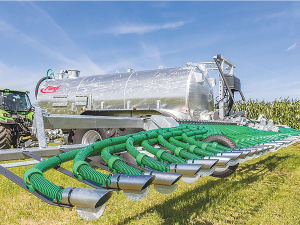With effluent becoming a more important part of farm management, particularly for its value as an alternative to bagged fertiliser, it is timely for the Power Farming Group to be introducing the Fliegl range of tankers.
Offering a range of sizes up to 27,500 litres, the German-built machines also offer tandem and triple-axle layouts in the Maxx Line Plus and Alpha Line models. Maxx Line Plus is equipped with tandem axles and available in 12,000, 14,000, 16,000, 18,000 and 20,000 litre capacities, while the triple axle Alpha Line is offered with 23,000, 25,000 and 27,500 litre sizes, meaning that the two ranges can be towed with tractors from 100 to 250hp.
As the tankers are expected to carry large weights, suspension systems are an important consideration, so 12,000 and 14,000 litre Maxx Line Plus units are fitted with Fliegl’s Giant assembly, utilising springs and HD bearings to offer individual wheel guidance. The Giant Plus format, used on 16,000 to 20,000 litre machines, is maintenance-free, using rubber mounts and designed specifically for high axle loadings, using trailing arms for high speed and cornering stability.
On larger tankers of 23,000 litres and above, the Jumbo Giant Plus assembly features parabolic springs that help lower the centre of gravity by around 20cm, making them particularly suitable for hilly areas. As an option, customers can specify air or hydraulic suspension that allows lift axles and helps reduce ground compaction.
Standard tyre equipment on the Maxx Plus Range is 750-60R 30.5 profile, each rated to 6,740kg capacity at 40km/h and are also recommended as an upgrade for the Alpha Line Series. Likewise, forced steering upgrades help manoeuvrability, particularly when reversing, and help to reduce tyre wear. At the heart of the system, K50 ball joints are connected to link arms situated on each side of the drawbar and connected to the tractors hydraulic system. The pressurised system forces the oil displaced to turn the steering axles in opposing directions, meaning the machine track closely follows that of the tractor.
At the rear of the machine there is a move away from traditional splash-plate designs to placing effluent directly on or in the ground, helping to reduce nitrogen losses and odour. All ground distribution systems start with a unique screw type delivery manifold that serves to remove foreign objects into traps at the end of the distribution trough, with benefits said to be reduced wear compared to bladed macerators and a uniform flow of material to the outlets.
Final application is taken care of by dribble bar, trailing shoe or disc injection set ups. The former is available in operating widths from 6 to 18m, with 24 to 72 outlets respectively. The units fold to a compact 2.6m for transport and offer slope compensation and over-pressure functions.
The Skate trailing shoe configuration features spring loaded injection shoes with an 8kg blade pressure, mechanical or hydraulic section control and an outlet spacing of 250mm. Offered in working widths of 9 to 21m, with 36 to 84 outlets, booms fold to less than 3 metres for transport.
The Vario Disc injection system is said to be capable of placing effluent between 5 and 10cm below ground level, using 530mm diameter angled discs spaced at 25mm across operating widths of 3 to 7.5m with 11 to 28 discs respectively. A range of options includes foam separators, suction nozzles with docking stations, turbo fillers and discharge accelerators.

















